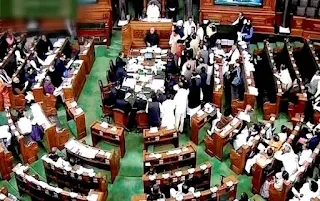The Lok Sabha has passed the Trafficking of Persons (Prevention, Protection and Rehabilitation) Bill, 2018. The Bill provides for the prevention, rescue, and rehabilitation of trafficked


persons and seeks to establish National Anti-Trafficking Bureau to investigate trafficking cases.
a. Anti-Money Laundering Units (AMLUs)
b. Anti-Corruption Units (ACUs)
c. Anti-Trafficking Units (ATUs)
d. None of the above
Q2. The Bill proposes the establishment of what, to investigate trafficking cases and implement the provisions of the Bill?
a. National Anti-Trafficking Bureau (NATB)
b. National Anti-Corruption Bureau (NACB)
c. National Anti-Terrorism Bureau (NATB)
d. None of the above
- It also provides for the setting up of Anti-Trafficking Units (ATUs) at the district level which will deal with the investigation, prevention, rescue and protection of victims and witnesses.
Details of the Bill:
National Anti-Trafficking Bureau (NATB):
- The Bill proposes the establishment of NATB to investigate trafficking cases and implement the provisions of the Bill.
- NATB will comprise of police officers and any other officers as required.
- It will take over investigation of any offence under the Bill referred to it by two or more states.
- Further, it may request a State Government to co-operate in investigation or transfer the case to the State Government for investigation and trial, with approval from the Central Government.
What are the functions of NATB?
- Coordinate and monitor surveillance along known trafficking routes
- Facilitate surveillance
- Enforce and take preventive steps at source
- Transit and destination points
- Maintain coordination between law enforcement agencies and NGOs and other stakeholders
- Increase international cooperation with authorities abroad for intelligence sharing and mutual legal assistance
State Anti-Trafficking Officers:
- The Bill mandates State Government to appoint a State Nodal Officer.
- The officer will be responsible for follow up action as per provisions of the Bill and as per the instructions of the State Anti-Trafficking Committee and provide relief and rehabilitation services.
- It also mandates the State Government to appoint a Police Nodal Officer at the State and District levels.
- The State Government will also designate Anti-Trafficking Police Officers for each district to deal with all matters related to trafficking in the district.
Anti-Trafficking Units:
- The Bill provides setting up of Anti-Trafficking Units (ATUs) at district level.
- They will deal with prevention, rescue and protection of victims and witnesses and for investigation and prosecution of trafficking offences.
- In districts where ATU is not functional, this responsibility will be taken up by the local police station.
Anti-Trafficking Relief and Rehabilitation Committee:
- The Bill provides for establishment of these committees (ATCs) at all three levels viz. national, state, and district levels.
- These committees will be responsible for providing compensation, repatriation and re-integration of victims in society, among others.
Search and rescue:
- The Bill empowers the Anti-Trafficking Police Officer or ATU to rescue persons, if they are in imminent danger.
- They will be produced before the Child Welfare Committee or the Magistrate for medical examination.
- The district ATC will provide relief and rehabilitation services to rescued persons.
Protection and rehabilitation:
- The Bill mandates The Central and State Government to set up Protection Homes to provide shelter, food, counselling, and medical services to victims.
- It also mandates that the Central or State Government will maintain Rehabilitation Homes in each district to provide long-term rehabilitation to victims.
- In all cases, rehabilitation of victims will not be dependent on criminal proceedings being initiated against the accused or outcome of such proceedings.
- Union Government will also create Rehabilitation Fund which will be used to set up these Protection and Rehabilitation Homes.
Time-bound trial:
- The Bill provides for setting up designated courts in each district to complete trial within a year.
Penalties:
- The Bill specifies penalties for various offences including for promoting trafficking, trafficking of persons, disclosing identity of victims and aggravated trafficking such as trafficking for bonded labour and begging.
- For trafficking, it prescribes rigorous imprisonment of 10 years up to life imprisonment, along with minimum fine of Rs. 1 lakh.
- For publishing of any material related to identities to victims, it prescribes imprisonment between 5 to 10 years, and fine between Rs 50,000 to Rs.1 lakh.
Questions:
Q1. The Bill provides for the setting up of which units at the district level which will deal with the investigation, prevention, rescue and protection of victims and witnesses?a. Anti-Money Laundering Units (AMLUs)
b. Anti-Corruption Units (ACUs)
c. Anti-Trafficking Units (ATUs)
d. None of the above
Q2. The Bill proposes the establishment of what, to investigate trafficking cases and implement the provisions of the Bill?
a. National Anti-Trafficking Bureau (NATB)
b. National Anti-Corruption Bureau (NACB)
c. National Anti-Terrorism Bureau (NATB)
d. None of the above

